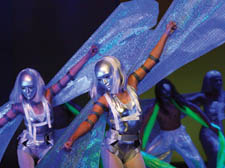|
|
 |
| |
| |
Gimmicks mean it's no Coronation treat
REVIEW: THE CORONATION OF POPPEA
Eno
THE problem with the new production of Monteverdi’s The Coronation of Poppea at ENO, which opened last week, is that what we see on stage is completely at odds with what we hear.
Written in 1642, the opera deals with political intrigue at the Roman emperor Nero’s court with Shakespearian breadth, ranging from sexual lust and moral ambiguity, to philosophical commentary, with sharp satire and comedy.
Chinese director Chen Shi-Zheng and his designer Walt Spangler give us instead a tawdry pantomime, neither sexy, nor thought-provoking, just vulgar. It is all the more disappointing after their attractive and sensitive Orfeo setting for ENO 18 months ago. So, far from illuminating the piece, one is distracted by irrelevant stage images – all-pervasive underwater video footage, a motorised snail, and a mobile pumpkin on which Ottavia, Nero’s spurned wife, is marooned for the evening, having to be wheeled on and off. The dayglow-bright, modern costumes range from Poppea’s Liz Hurley-style bikini and slinky dresses, to flouncing caricature transvestite – taking in a gardening outfit replete with lawnmower on the way.
The best singing came from the veterans – Robert Lloyd, still in fabulous voice with commanding presence as Seneca, and Diana Montague’s elegant, warm-toned Venus.
The rest of the cast, with insufficient voice or personality, were upstaged by it all, their singing marred by the modern fashion in music of this period to adopt ugly vocal mannerisms, such as crooning and leaning into sustained notes, and singing without vibrato.
Anne Grevilius’s Nero was more petulant teenager than cruel, all-powerful emperor. Kate Royal’s Poppea lacks vocal radiance and does not project text well. Both are underpowered, particularly in the lower registers.
There was more pleasure to be had looking at the pit with a wonderful array of chitarroni and other period instruments, and from the orchestral playing under Laurence Cummings’ persuasive and spirited conducting.
Helen Lawrence |
 |
|
 |
|
|
 |
|








